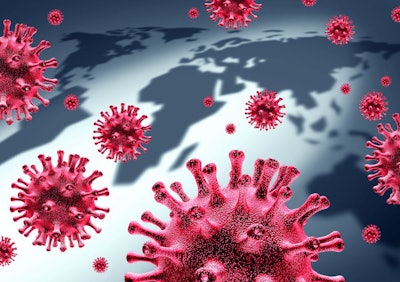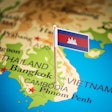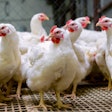
USA Poultry and Egg Export Council representatives around the world share their experiences with the COVID-19 pandemic
The USA Poultry and Egg Export Council (USAPEEC) recently showed its appreciation for health care workers in Taiwan by providing chicken lunch boxes – or bento boxes – to staff at six hospitals.
The USAPEEC, a nonprofit based in Stone Mountain, Georgia, has a network of representatives all over the world, and some of those representatives reported the situation concerning the novel coronavirus (COVID-19) pandemic in their respective regions.
Feed Strategy asked Greg Tyler, USAPEEC senior vice president, and Sarah Li, USAPEEC’s regional director based in Hong Kong, about USAPEEC’s charitable efforts and how COVID-19 is affecting countries where it has its offices.
Feed Strategy: Tell me more about the bento box distribution in Taiwan.
Sarah Li: The COVID-19 pandemic is affecting the people’s livelihood around the world, and exerting tremendous workload for the health care workers. To show our appreciation for the frontline health care workers for their dedication amid the epidemic, USAPEEC worked with Chinese Gourmet Association and a bean curd company, Shunyuan Fresh Food, to organize a charity event captioned as “Love & Heartfelt Lunch box for health care practitioners” in Taiwan on April 14 and 15.
Some 1,500 U.S. chicken lunch boxes were prepared to send to health care staffs at six hospitals in Taiwan, along with 2,000 bottles of soy milk drink. Chefs from Chinese Gourmet Association and volunteer workers including gourmet critics helped to prepare these lunch boxes, which featured a piece of soy-marinated U.S. chicken drumstick, an egg and some vegetables. We wanted to recognize the hard work and dedication that the health care workers have placed around the clock to flight with the epidemic and help saving life. They all deserve an applaud and a delicious and nutritious meal.
FS: How did you pick which hospitals would receive the donations? Are those hospitals particularly hard hit?
SL: As for the hospitals where we sent the U.S. chicken bento boxes last week, they were picked based on their location (easy accessibility) and open-minded management. Some hospitals are reluctant to participate in charity events.
FS: Are any other USAPEEC teams in other countries doing similar projects or other COVID-19 relief? If so, what are they doing?
Greg Tyler: This has been the only charity-type event we are doing at this time, but that could change if the crisis extends. We are doing a great deal of social media programs worldwide which emphasize the safety and wholesomeness of U.S. poultry and eggs. In addition, we have shifted a number of our seminar programs to virtual programs. These virtual programs have actually broadened our reach in some markets and have allowed us to educate a larger audience of trade contacts.
FS: What are your teams in other countries reporting about the COVID-19 pandemic in their respective areas?
GT: Below is a list of updates from our USAPEEC offices around the world.
Europe
In Albania, the first cases of COVID-19 were discovered on March 9, which immediately prompted the closure of everything except for food businesses and pharmacies. Importers of U.S. poultry have been operating at full capacity until now, although sales have completely stopped for items such as chicken grillers that normally went into the hotel and restaurant sector. Products such as chicken leg quarters, drumsticks, wings, breasts, which are being sold for retail and distribution, are still selling well.
In the EU, the situation is catastrophic. The economy is out of control, unemployment is rising rapidly, and in some areas, the hotel and restaurant sector is close to being completely wiped out. A large percentage of the EU population is still in quarantine.
Korea
Consumers have reduced outdoor activities, including shopping and dining trips. According to the research on “COVID-19’s influence in the Korean restaurant Industry,” 95.2% of restaurant owners said the number of customers had dropped sharply after the first COVID-19 detection on January 20. Total online sales, however, increased by up to 25% in February and 82% for the food delivery service. So COVID-19 has hurt the economy but aided the “homeconomy.”
The Korean food industry is improving the delivery services system and the drive-through system, and the hotel industry decided to operate food delivery service and pick-up service. Primary targets are single households to families of more than two people who are interested in preparing for a home party. Premium hotels are currently providing the delivery service in Seoul for its superior restaurant menus in a specialized lunch/dining box package for the first time. The franchise restaurant industry is conducting several promotions with the non-face-to-face delivery service to capture consumer attention. Franchises also have started to offer consumers a safer delivery service.
Panama
Shopping, recreational and sports centers are temporarily closed. Supermarkets can only operate with extreme levels of security for workers and customers, with signs and advertisements posted explaining the coronavirus. As in restaurants, all users must be one meter away and the use of masks is mandatory. The population is restricted from going out into the streets; they can only go out three times a week, for a period of two hours a day depending on the identity document number. The borders remain closed at least until April 30.
According to importers, the economy in Panama is collapsing and the coronavirus came on the heels of a several years-long slowdown that has exacerbated the situation. However, supermarkets continue to feed the market with chicken products. Purchases have accelerated and markets are trying to ensure that product is not sold out. Supermarkets are taking advantage of some chicken offerings from the U.S. to import right now. Supermercados El Rey has resumed imports of turkey assortments. Processors continue to import chicken meat as raw material for production. The government will be implementing an option to give vouchers for meals through the identification card, but it is still being tested.
Guatemala
Schools and universities are suspended, and it is suggested that people work at home except for businesses in the health, food and beverage, gas and telecommunications sectors to supply basic services. Events of all kinds and of any number of people are prohibited. Air, land and sea borders are closed. Until further notice, the population remains in quarantine except to allow for acquiring basic necessities. The use of masks is mandatory and there is a mandatory curfew of 4 p.m. to 4 a.m. Circulation from one city to another is prohibited.
At supermarkets, chicken shipments continue to be carried out steadily, and consumption has remained stable. In the case of open markets, shipments have decreased considerably, as this sector is greatly affected by the measures taken by the government. The biggest fear for importers who ship chicken to open markets is poor cash flow and having large inventory volumes, which would generate high energy and other costs. For importers of chicken and turkey meat that are committed to foodservice, the market is changing rapidly, and they are adapting to the change in order to have better sales strategies. Other importers have seen that turkey breast is still in demand. Scheduled imports continue to take place.
Vietnam
One of the leading markets for U.S. poultry exports, Vietnam was seeing record numbers at the beginning of 2020 with January to February totals registering 45,300 metric tons of U.S. poultry exports valued at US$48.6 million (a 74% increase in volume and a 103% increase in value when compared with the same period in 2019). However, this strong start will surely face a slow down due to the entire nation initiating strict social distancing measures as of April 1 to limit the spread of the COVID-19 virus. The whole country is under self-isolation and people are restricted from leaving their homes, except for food and medicines. The gathering of more than two people is also banned, resulting in all foodservice outlets to only operate online with home delivery service or take away. Luckily, to this point, there have not been any port congestion issues and logistic disruptions, outside of the estimated shipping time from the U.S. to Vietnam taking one to two weeks longer than normal.
Philippines
Another major market for U.S. poultry exports, especially chicken leg quarters and mechanically deboned meat (MDM), with 2019 figures totaling 100,000 metric tons valued at US$117 million. Although Philippines President Rodrigo Duterte declared a state of public health emergency on March 8 and placed Luzon Island (including Manila) under quarantine, food items and farm inputs will have “free movement” in order to sustain stable prices of agriculture commodities and food products. But how well this is being implemented is questionable as the lockdown of Luzon has caused cargo congestion at the Manila ports that may lead to a terminal shut down, which in turn may lead to shortages of food and other essential supplies. The Philippine government has given cargo owners one week from April 2 to withdraw their reefers from Manila ports or the cargo will be forfeited and disposed of by the Bureau of Customs.
Africa
All markets are affected by COVID-19 and discussions with traders confirm that sales have declined and markets are slowing, including Angola, Benin/Nigeria, Gabon, Gambia, Ghana, Mozambique and South Africa. Wholesale and supermarket sales were strong prior to the implementation of lockdowns, as customers went on shopping frenzies. However, the market has turned and movement is restricted. Sales have declined and many consumers don’t have the disposable income they need to fill their food basket. We believe the economic impacts of the COVID-19 pandemic in sub-Saharan African countries will be known only after the situation is brought under control.
The market is being affected by immediate shocks to livelihoods, as well as by severe disruptions to value chains, industries and government revenue for the foreseeable future. The United Nations Economic Commission for Africa (UNECA) estimates that the GDP growth in Africa will decline from 3.2% to 1.8% in 2020. A significant proportion of the working population in Africa is engaged in the informal sector, where activities are not captured by formal accounting systems, so GDP calculations may not present a true economic picture. The bulk of Africa’s workforce operate in the informal sector, within micro-, small-, and medium-sized enterprises. Border closures translate to loss of income for small-scale traders operating between countries.
In light of the pressures currently faced by African countries, it becomes pertinent to anticipate the impact of disrupted trade patterns on economic performance and reflect the new realities of African economies. As global poultry prices are crashing, especially in Europe, many traders remain skeptical about purchasing. Several African markets will also be impacted by a shortage of foreign currency, making trade extremely difficult throughout this pandemic.
Middle East
All countries are on survival mode worrying mostly about food and medication as the bare necessities. Governments are trying to protect their economies to keep in shape and people are concerned about their daily needs to survive the crisis. According to the Arab Tourism Organization, losses of $40 billion in the tourism sector by the end of April will result in a great decline in economy. Many countries like Dubai, Lebanon, Egypt and Morocco have this sector as a strategic part of the economy, accounting for a significant portion of their GDPs. Governments have decided to lay off thousands of employees, and employees being mainly expatriates – especially in Saudi Arabia, the United Arab Emirates and Kuwait – prefer to fly back to their countries. Staying home and coping with the expenses of rent and food is not easy for them to bear.
The Middle East countries are tight in all the necessary needs for a pandemic. Obviously, food is the main necessity, especially considering that our region is mostly import dependent. Imports of food products are promising although in fewer volumes and varieties. It is not easy to find all the brands of different food products people are used to, but in these days, it is the variety that counts regardless of the brand. Prices have hiked, but people have no option but to pay the premium for the daily needs. In the meantime, here is a steady supply of imported foods, locally produced foods, including local poultry in countries that produce poultry such as Jordan, Lebanon, Morocco and Egypt.
View our continuing coverage of the novel coronavirus (COVID-19) pandemic.
















